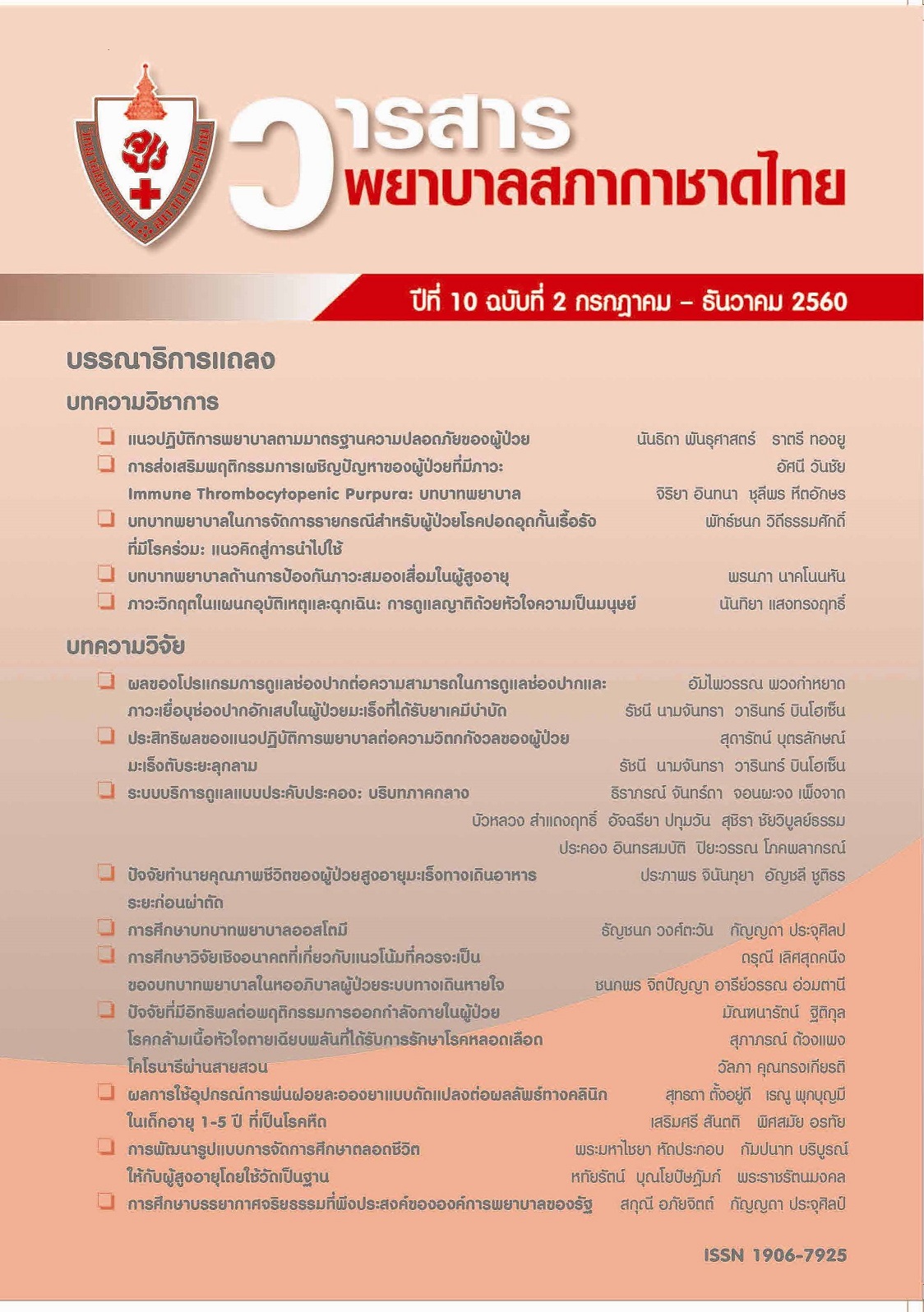The Development of Life-long Education Management Model for the Elderly through Temple Based Learning
Keywords:
life-long learning, temple base learning, การศึกษาตลอดชีวิต, รูปแบบการจัดการศึกษาสำหรับผู้สูงอายุ, model of education for the elderlyAbstract
การวิจัยนี้มีวัตถุประสงค์เพื่อศึกษาสภาพ ปัญหา และความต้องการการศึกษาของผู้สูงอายุที่เข้าไปประกอบกิจกรรมในวัด สร้างรูปแบบการจัดการศึกษาตลอดชีวิตให้กับผู้สูงอายุโดยใช้วัดเป็นฐาน และ ประเมินความเป็นไปได้ในการนำรูปแบบไปปฏิบัติ ใช้วิธีศึกษาแบบเทคนิคเดลฟายโดยสอบถามความคิดเห็นผู้ทรงคุณวุฒิ จำนวน 3 รอบ ผู้ทรงคุณวุฒิ ประกอบด้วยฆราวาส 15 คน พระสงฆ์ 2 รูป เป็นผู้เชี่ยวชาญด้านการศึกษาผู้ใหญ่ การศึกษาตลอดชีวิต และการบริหารการศึกษา เครื่องมือที่ใช้ในการเก็บข้อมูลเป็นแบบสอบถามความคิดเห็น ประกอบด้วย แบบสอบถามปลายเปิดในรอบที่ 1และแบบสอบถามแสดงความคิดเห็นแบบปลายปิดในรอบที่ 2 และรอบที่ 3 การวิเคราะห์ข้อมูลใช้สถิติวิเคราะห์ค่ามัธยฐานและค่าพิสัยระหว่างควอไทล์
ผลการวิจัยพบว่า ผู้ทรงคุณวุฒิที่เป็นกลุ่มตัวอย่างมีความคิดเห็นสอดคล้องเกี่ยวกับองค์ประกอบของการพัฒนารูปแบบการจัดการศึกษาตลอดชีวิตให้กับผู้สูงอายุโดยใช้วัดเป็นฐานอย่างสอดคล้องกันอยู่ในระดับมากถึงมากที่สุด (X̅ = 4.71, SD= 0.59). ซึ่งมี 5 องค์ประกอบได้แก่ องค์ประกอบที่ 1 ด้านปรัชญาและทฤษฎีในการจัดการศึกษา องค์ประกอบที่ 2 ด้านหลักการและเป้าหมาย องค์ประกอบที่ 3 ด้านกิจกรรมการจัดการศึกษา องค์ประกอบที่ 4 การจัดการเรียนรู้และการวัดผล องค์ประกอบที่ 5 แหล่งเรียนรู้ สื่อ และเทคโนโลยี
ผลการประเมินรับรองรูปแบบ สามารถนำรูปแบบไปใช้ในการจัดการศึกษาตลอดชีวิตให้กับกลุ่มผู้สูงอายุโดยใช้วัดเป็นฐานได้ทั้งในส่วนกรุงเทพมหานครและส่วนภูมิภาค
The Development of Life-long Education Management Model for the Elderly through Temple Based Learning
The objective of this research was to study the stage, problems, and needs for education of the elderly that carry out activities in temples. This is to devise a format of elderly lifelong learning which uses the temple as a base and to evaluate the possibility of bringing this format into practice. This study was conducted using the Delphi technique in three rounds of interviews with 17 chosen experts in Adult Education, Lifelong Education, and Education Administration. Open-ended and close-ended questionnaires were employed as data collection instruments in the first and the other two rounds of interviews, respectively. The interviews were conducted from March to June 2017. The median and quartile range values were used in the analysis of the results.
The result shows that experts in the sample group have consensus on the elements of temple-based lifelong learning format for the elderly in a high to very high level of agreement (X̅ = 4.71,S.D.= 0.59). The elements are: 1.Philosophy and theory of education management; 2. Principle and objectives; 3. Educational management activities; 4. Learning methodology and evaluation; and 5. Learning facilities and technology. Regarding the aspect of format verification, from the group conversation, the experts agree that the format can be verified and employed as a temple-based life-long education format for the elderly both in Bangkok and other provinces.
Downloads
Published
Issue
Section
License
เนื้อหาบทความหรือข้อคิดเห็นต่างๆ ในวารสารพยาบาลสภากาชาดไทยนี้ เป็นความคิดเห็นของผู้เขียนบทความ ไม่ใช่ความเห็นของกองบรรณาธิการ หรือสถาบันการพยาบาลศรีสวรินทิรา สภากาชาดไทย






